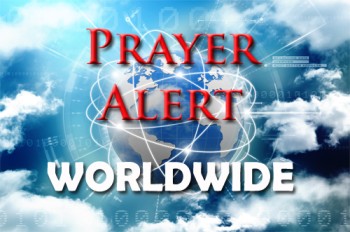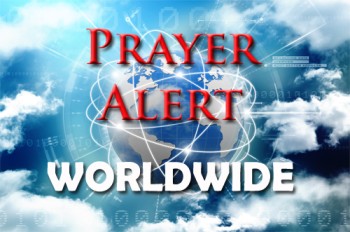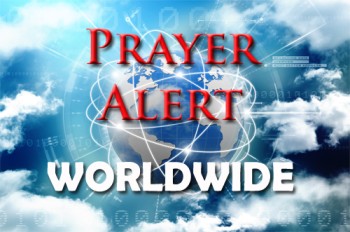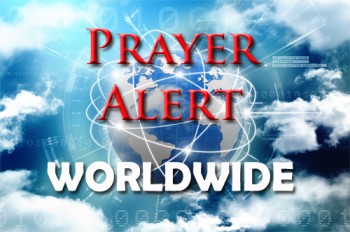Displaying items by tag: Asia
Iran: ‘unimaginable joy’ for an undercover believer
Bita’s life in Iran was marked by abandonment, abuse, and despair. Raised in hardship, forced into servitude, and married at 14 to an unfaithful addict, she endured decades of rejection and loneliness. Broken and suicidal, she was rescued by a friend, then invited to a secret house church. There she first heard of Jesus’ love for the brokenhearted, and for the first time she felt truly seen. That night she surrendered her shattered life to Christ. Immediately, her children noticed a change: her burdens lifted, and joy began to replace despair. Later, at a women’s conference for persecuted believers, she testified that God had wiped away bitterness and given her 'unimaginable joy.' Though she must still worship in secret, hiding her Bible and whispering prayers, Bita’s faith is unshaken. She longs to help other women find the same freedom and healing in Jesus. Her story mirrors numerous Iranian women who, despite persecution and rejection, are discovering the beauty of Christ’s redeeming love.
Pakistan: devastation and deaths caused by monsoon floods
The village of Bishnoi in northern Pakistan has been devastated by a sudden flash flood, leaving entire homes buried beneath rocks and debris. On 15 August, torrential rains triggered a surge of water that swept through the village, destroying nearly every house. Locals described the scene as catastrophic, with families trapped under stones and crops flattened across the valley. Rescue operations continue with limited equipment, as survivors search desperately for missing loved ones. The area has suffered over 300 deaths, making it the hardest-hit region in Pakistan’s monsoon season, which has claimed more than 500 lives nationwide; there have also been many deaths in India and Nepal. Climate experts warn that melting glaciers, accelerated by global warming, are worsening the impact of heavy rains and landslides. Amid tragedy, there were moments of heroism, such as a school principal in the Swat valley who ordered the evacuation of 900 children only minutes before floods destroyed the building. In Bishnoi, families mourn as relief and recovery efforts continue.
Gaza: Hamas agrees to Qatar’s latest ceasefire proposal
Qatar has emphasized the urgent need for a ceasefire in Gaza, highlighting what it called a ‘positive response’ from Hamas to a new truce proposal. The plan, similar to an earlier US-brokered offer previously accepted by Israel, calls for a sixty-day pause in fighting, the release of some hostages in exchange for hundreds of Palestinian prisoners, expanded humanitarian aid, and negotiations toward a lasting settlement. Israel, however, is maintaining its stance that the war will continue until Hamas disarms and all hostages are freed. Foreign minister Israel Katz says that fear of Israel’s plans to occupy Gaza city is bringing Hamas back to the negotiating table. Meanwhile, conditions in Gaza remain dire. The UN has warned that the minimal aid entering Gaza is far from sufficient, with hunger-related deaths increasing. Officials blame Israeli restrictions on humanitarian supplies, warning of imminent famine. Breaking news: Israel is calling up 60,000 reservists in preparation for its planned invasion of Gaza. See
Hong Kong: UK and Australia each grant asylum to a pro-democracy activist
Australia and the UK have each granted asylum to a prominent Hong Kong pro-democracy activist. In 2020, lawmaker Ted Hui threw rotten plants on the floor of the legislative council chamber to protest against the sweeping new national security law. Facing arrest for leading anti-government protests, he fled with his family to Australia, where they have now been granted protection visas. Student leader Tony Chung left in 2023, citing ‘enormous stress’ from constant police scrutiny. He was later convicted under the national security law for calling for Hong Kong’s secession, but has now received refugee status and a five-year residence permit in the UK. The Hong Kong government has strongly condemned the UK and Australia for ‘harbouring offenders’, stating that its arrests are based on ‘facts and evidence’ rather than politics. Critics, however, maintain that the law is being used to silence dissent and spread fear.
Malaysia: urgent action needed to combat school bullying
Bullying remains a pervasive and deadly problem in Malaysia’s schools, with thousands of cases recorded annually and incidents escalating to violence and even death. Despite public outrage, policy gaps and weak enforcement allow abuse to persist, including in elite institutions. Victims suffer long-term psychological harm, while perpetrators may develop behavioural problems and criminal tendencies. Research shows nearly 80% of Malaysian students have been involved in bullying, often as both victims and aggressors. Teachers, while crucial for prevention, can sometimes contribute to the problem, highlighting the need for systemic reform. Unlike many Asian neighbors, Malaysia lacks comprehensive anti-bullying laws. Experts recommend strict legislation, independent investigations, national reporting systems, whistleblower protections, school-based mental health support, educator training, and transparent accountability. Without decisive reform, tragedies like the recent death of Form One student Zara Qairina will continue to erode public trust and student safety.
Japan: a great example of embracing Christ’s peace in troubled times
Political unrest; environmental changes; natural disasters; human rights violations; war and famine; migration. The list could go on: all of them are causes of widespread anxiety and stress. While experts recommend practical strategies like healthy living, Christians also turn to prayer, scripture, service, and witness. History offers models of resilience during turbulent times, such as Japanese author, minister, and activist Toyohiko Kagawa. Born in 1888, he lived through poverty, war, natural disaster, and political unrest, yet maintained joy and hope. His poetry reflects a spirit unbound by chains, seeking light and peace in Christ. He worked for justice, environmental stewardship, women’s suffrage, and peace, which earned him several jail sentences but also a nomination for the Nobel Peace Prize. His final words were 'Please do your best for world peace and the church in Japan’. His life shows us how to navigate chaos: embrace Christ’s peace, shine his radiance, and let joy endure.
Israel: plans to build 3,000 houses in contested West Bank settlement area
Far-right finance minister Bezalel Smotrich has announced plans to approve over 3,000 housing units in the contested E1 settlement area between Jerusalem and Maale Adumim in the occupied West Bank. Long frozen due to international opposition, the project would physically separate East Jerusalem from the rest of the West Bank, undermining prospects for a contiguous Palestinian state. Smotrich declared the plan would ‘bury the idea’ of such a state, describing it as an assertion of Israeli sovereignty. Settlement expansion is considered illegal under international law, though Israel disputes this. The announcement comes amid growing international momentum toward recognising Palestinian statehood, which Israel opposes. Critics warn that the move deepens annexation, fuels conflict, and blocks the path to peace. Smotrich, together with national security minister Itamar Ben-Gvir, was sanctioned by the UK in June over ‘repeated incitements of violence against Palestinian communities’ in the occupied West Bank: see
China / USA: trade truce extended for a further ninety days
Donald Trump has extended the trade truce with China by another ninety days, narrowly avoiding a major escalation between the world’s two largest economies. The announcement came just hours before the previous deadline was to expire, averting a spike in US tariffs on Chinese imports and likely retaliatory action from Beijing. Both governments confirmed the extension, maintaining existing terms while allowing more time for negotiation. This delay is seen as a temporary relief for global markets and US companies which depend on trade with China. Earlier trade disputes saw tariffs soar to triple digits, severely disrupting international commerce and sparking volatility in financial markets. Although current tariff levels remain high, they are significantly lower than the peak rates imposed in May. Talks between Washington and Beijing continue, with hopes for a more permanent resolution and a possible summit between Trump and Xi Jinping later this year. However, key issues remain unresolved.
Gaza: is Netanyahu contemplating a full occupation?
After nearly two years of war in Gaza, Benjamin Netanyahu is reportedly preparing to escalate the conflict further by ordering a full military occupation of the territory, despite international outrage, domestic opposition, and dissent within Israel's own military. Critics allege that his push is politically motivated, aimed at preserving his fragile coalition and delaying his corruption trial. Analysts question whether the Israeli army, already strained and suffering from troop shortages and internal resistance, can sustain such an operation. Over 600 ex-military officials have urged Donald Trump to intervene diplomatically, stating that in their professional opinion, Hamas no longer poses a strategic threat. Despite widespread destruction, the goal of rescuing all the Israeli captives has not been achieved. Public support continues to decline, and many accuse Netanyahu of prioritising political survival over peace or national security. Further escalation could deepen the humanitarian catastrophe and international isolation.
India: relationships with the USA take a downward turn
US-India relations entered a turbulent phase when Donald Trump tore into India for its continued oil imports from Russia and slow progress on trade negotiations. Formerly close to Prime Minister Narendra Modi, Trump, accusing India of funding Russia’s war in Ukraine, has vowed to raise tariffs on Indian exports to 50%. India regards its Russian energy imports as economically necessary; it has a longstanding relationship with Russia and is among the largest importers of Russian oil. Modi’s government has so far resisted Trump’s pressure, particularly over opening up US access to the heavily protected agriculture and dairy sectors. In response to Trump’s belligerent language, Modi has called on citizens to buy only Indian-made goods, leading to greater economic self-reliance. Political commentators note that it will be very difficult for Modi to give any large concessions in a trade deal, given the growing anger within India towards Trump.









